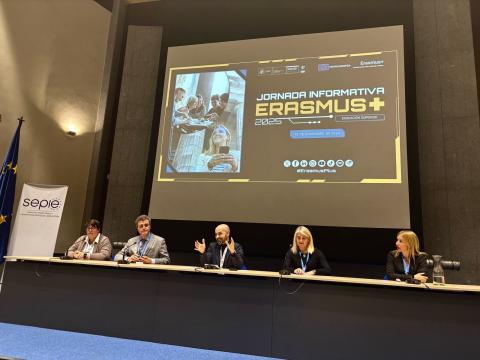
Yesterday, on December 18th, as part of the Erasmus+ 2025 Annual Information Day for Higher Education organized by the Spanish Service for the Internationalization of Education (SEPIE), Noelia López, Senior Project Manager at the UA's Institutional Project Management Office (OGPI) and project coordinator, was invited to present ANSWER – Promoting the Inclusion of Students with Disabilities in Higher Education in Rwanda. The participation of OGPI took place within the framework of the panel “Building Bridges Between Continents: Erasmus+ Experiences with Sub-Saharan Africa,” providing a unique opportunity to highlight the significant work being done to improve accessibility, ensure learning conditions, and promote policy changes towards the inclusion of students with disabilities in Rwanda’s higher education system. This important event was held at the National Mint and Stamp Factory in Madrid, bringing together higher education professionals from across Spain to share experiences and strengthen international cooperation.
Coordinated by the UA through OGPI, ANSWER is an Erasmus+ (KA2) structural training project aimed at ensuring equal opportunities for students with disabilities by facilitating their transition to the labor market through the effective implementation of inclusion policies in higher education in Rwanda, using the University of Alicante's Student Support Center (CAE) and Digital Accessibility Unit as international models of inclusion and accessibility.
Among other aspects, the presentation explained how the ANSWER project is achieving significant progress in promoting inclusion in higher education in Rwanda. At the institutional level, three support centers have been established at partner Rwandan universities, dedicated to the care and integration of students with disabilities in all aspects of university life. These centers provide resources and personalized assistance to ensure that all students have equal opportunities. Another key aspect is the acquisition of assistive technologies at these centers, which will improve the services available to students with disabilities and enhance their academic performance. Furthermore, institutional policies have been reviewed, and architectural barriers are being removed at partner universities. Additionally, the project is actively working on a framework for the effective implementation of national inclusion policies within the country's higher education system. Lastly, a video was presented showcasing the success of the ANSWER project, in which several Rwandan partners, including staff from the support centers and students with disabilities, shared their testimonials and expressed how the project has benefited them.
Thanks to the joint efforts of all partners, the ANSWER project has the potential to make higher education in Rwanda more inclusive and accessible for students with disabilities. As the project progresses, the partners will continue to work closely together, leveraging their expertise and resources to achieve the goal of a more inclusive higher education system in Rwanda.
For more information, visit the ANSWER Project website and its social media pages: Facebook, Instagram, Twitter, and YouTube.





